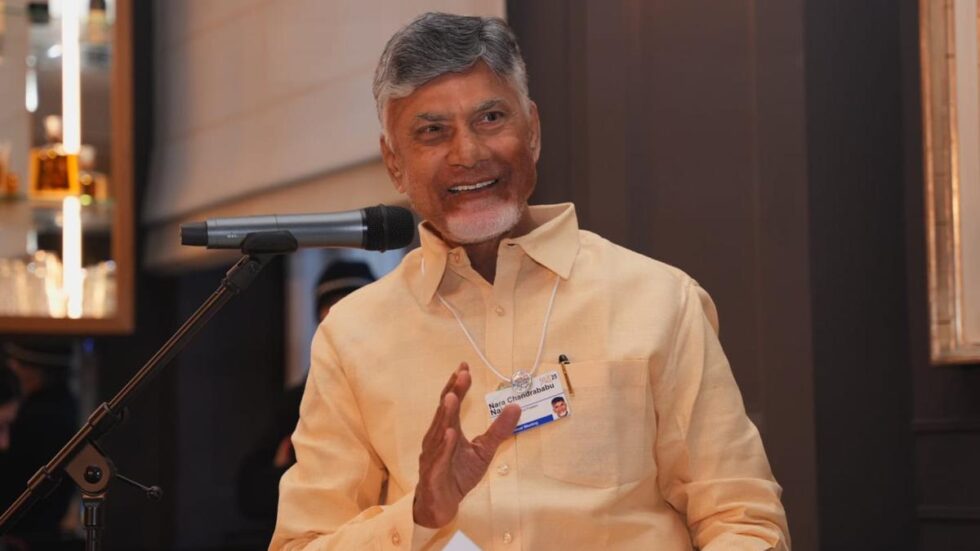
On the second day of the World Economic Forum (WEF) in Davos on Tuesday (January 21, 2025), Chief Minister N. Chandrababu Naidu addressed a special session of the Confederation of Indian Industries (CII) on green industrialization.
Highlighting his long-standing partnership with CII since 1995, he reflected on his journey of driving transformative change, citing Hyderabad’s emergence as one of India’s most livable cities and a global hub for IT, healthcare, and innovation as proof of concept.
“We have a demographic advantage, and Indian entrepreneurs, especially those from Andhra Pradesh, are excelling globally, contributing to the world economy. India is poised to lead, with Bloomberg predicting it will provide incremental GDP growth by 2027. From 2028 onward, it will be the Indian era,” he remarked.
Mr. Naidu applauded India’s current leadership under Prime Minister Narendra Modi, describing him as a “visionary leader” with a stable government, preparing for a “Viksit Bharat 2047” that envisions India as a global superpower. He expressed confidence that India will rank among the top two economies by 2047, with Indians becoming leaders in wealth creation.
Mr. Naidu emphasised the need for leveraging technologies like AI and real-time data to solve complex problems and improve everyday life, while outlining his vision for the Global Leadership Centre (GLC) in Amaravati to prepare future leaders. On this occasion, a letter of intent was exchanged between the IMD Business School, Switzerland, and GLC to enhance global competitiveness and leadership development.
Touching on sustainability, Mr. Naidu underscored India’s commitment to natural and organic farming, which he termed a “boon for the global community,” and highlighted the importance of including people as partners in governance through his proposed “P4 model”—public-private-people partnership.The Chief Minister urged corporate leaders to take responsibility for eradicating poverty and inequality, describing people as India’s greatest asset. He acknowledged Tata Sons Chairman N. Chandrasekaran’s guidance in steering the Swarnandhra 2047 economic development initiative.
With a focus on green industrialisation, deep-tech innovation, and inclusive leadership, Mr. Naidu expressed optimism about India’s role in driving global growth and fostering sustainable development.
The Chief Minister highlighted his administration’s ambitious plans to transform the State into a global hub for green energy and green hydrogen, setting a precedent for sustainable development and energy reforms.
Reflecting on his tenure, the Chief Minister shared his journey of introducing bold power reforms in 1999 amidst a national energy crisis. “The country was facing severe power shortages, and industries had to shut down. Despite fears and challenges, I introduced critical reforms, which initially cost me an election. However, today we are reaping the benefits of those decisions,” he stated.
Mr. Naidu said that under his leadership, Andhra Pradesh has witnessed significant advancements in solar and wind energy, reducing energy costs. “Scaling and innovation are the keys to success,” he emphasised.
The Chief Minister reaffirmed his commitment to transforming Andhra Pradesh into a clean energy hub, with a mission-mode approach to achieving sustainability goals. Key initiatives include: A massive $115 billion investment in the fuel sector to produce 500 MW of renewable energy and 500 million metric tons (MMT) of green energy by 2030, contributing 30% to the national target.
Highlighting collaborations, Mr. Naidu mentioned the Prime Minister’s recent visit to lay the foundation stone for a $21 billion green hydrogen project, a joint venture poised to accelerate India’s renewable energy ambitions. Additionally, Reliance is investing ₹65,000 crore in biofuel initiatives in the State.
As part of the Vision 2047 roadmap, Mr. Naidu outlined ten guiding principles focusing on cost optimisation, environmental balance, and positioning Andhra Pradesh as a leader in the global green hydrogen and fuel markets. “With our well-equipped ports like Kakinada, we are poised to export green energy products to the world,” he noted.





